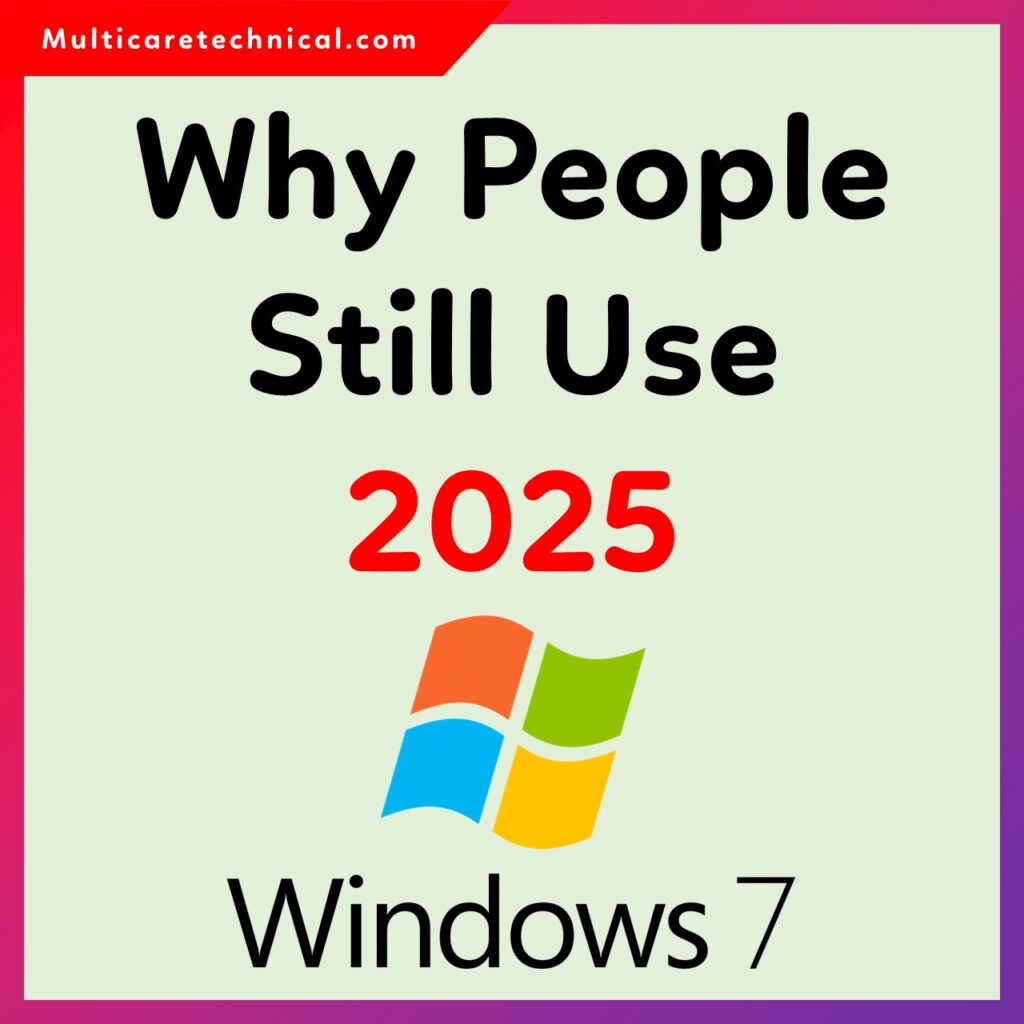Introduction
Microsoft officially ended support for Windows 7 in January 2020, yet the operating system refuses to die. In 2025, many individuals, businesses, and industries still run Windows 7 despite security risks and compatibility issues. Why is this the case? Let’s explore the reasons, the sectors where Windows 7 remains active, and how people keep it alive today.

Why People Still Use Windows 7
🖥 Old Hardware Compatibility
Windows 7 runs smoothly on older computers with low RAM and outdated processors, while Windows 10/11 often require modern hardware.
🔎 Familiarity and Comfort
The simple, classic interface of Windows 7 remains a favorite for many. Users find it easier to navigate compared to newer versions.
⚙ Legacy Software and Drivers
Industrial software, old business applications, and specialized devices are often tied to Windows 7. Upgrading could break workflows.
💰 Cost Factor
Upgrading to Windows 10/11 requires new licenses and often new PCs, which can be too expensive for small businesses.
🔒 Privacy Concerns
Windows 10 and 11 are known for telemetry and tracking features. Windows 7 is seen as less intrusive.
📥 Pirated Versions Still Circulate
In some regions, cracked versions of Windows 7 are still common, making it easy for people to stick with it.
Sectors Where Windows 7 is Still Used in 2025
- 🏭 Manufacturing & Industrial Control Systems – Many factory machines and CNC systems still run Windows 7-based software.
- 🏥 Healthcare – Medical devices like MRI, X-ray, and lab analyzers depend on Windows 7-certified applications.
- 🏦 Banking & ATMs – Many ATMs still rely on Windows 7 Embedded editions.
- 🏢 Small Businesses – Offices using old accounting and ERP software prefer stability.
- 🎮 Gaming Enthusiasts – Retro gamers use Windows 7 for older DirectX-based titles.
- 🛡 Government & Defense – Legacy defense systems remain on Windows 7, often offline.
- 🚍 Transportation & Logistics – Ticketing and kiosk systems in transport still run Windows 7.
The Risks of Using Windows 7 in 2025
- No official security updates since 2020.
- High risk of malware, ransomware, and hacking.
- Modern apps and browsers no longer support it.
- Limited hardware and software compatibility.
👉 For comparison, if you’re facing issues with modern systems, you might find our guide on Windows 11 Search Bar Not Working – Quick Fixes helpful.
How Users Keep Windows 7 Alive
- Using third-party antivirus and firewalls.
- Relying on modern browsers with extended support.
- Keeping critical machines offline (air-gapped).
- Running Windows 7 in virtual machines for compatibility.
If you’re interested in automating repetitive system tasks, check out our guide on Batch File to Create Folders and Sub Folders and Files.
FAQ About Windows 7 in 2025
Q1. Is Windows 7 still safe to use in 2025?
Not really. Since Microsoft ended support in 2020, Windows 7 is vulnerable to security threats. It’s safer to use it offline or in virtual machines.
Q2. Can Windows 7 run modern software?
Most modern apps, browsers, and drivers no longer support Windows 7. Compatibility issues are common in 2025.
Q3. Why do companies still use Windows 7?
Industries like healthcare, manufacturing, and banking rely on legacy software that only works on Windows 7. Upgrading is costly and complex.
Q4. Can I upgrade directly from Windows 7 to Windows 11?
No, you’ll need to upgrade to Windows 10 first or perform a clean install of Windows 11.
Q5. What is the best alternative for Windows 7 users?
Windows 10 is still widely supported and feels familiar. For lightweight systems, Linux is also a good option.
Conclusion
Windows 7 may be old, but in 2025 it continues to power industries, businesses, and personal computers worldwide. While the risks of using it online are high, its stability, compatibility, and simplicity ensure it still has a place. For many, the philosophy remains: “If it isn’t broken, don’t fix it.”